When Ms. Wilkens first approached me about submitting a session to present at MozFest, I wasn’t sure what to think. Moz? Like… Mozilla? The web browser? When I asked her what MozFest was – what kind of conference? What kind of people will be there? What will I learn? – she just smiled. “It’s hard to describe,” she said. And it turns out that she was right.
Although you might recognize Mozilla from the Firefox browser on your laptop, it turns out that the name means much more than that. Mozilla is also home to the Mozilla Foundation, which describes itself as “the proudly non-profit champions of the Internet, helping to keep it healthy, open and accessible to all.” Through open-source tools, education, and shared information, the Foundation and its employees work to make the internet available to everyone equally so that together, we can use it to make the world a better place. Pretty cool, huh? No wonder Ms. Wilkens couldn’t describe it.
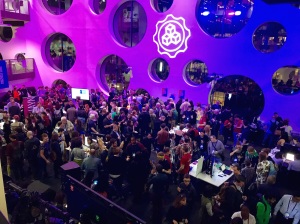 Our session was accepted and last month, we headed to London to meet with other MozFest-ers from around the world at Ravensbourne College to talk about – among many other things – the internet. All around me, people chatted about the health of the internet, about the importance of the open internet, about open-source this and leadership-that. The jargon itself wasn’t intimidating, thanks to approximately 2,000 smiling experts willing to talk to you about it endlessly; it was the experts themselves that made me bite my nails. Because when I say experts, I truly mean it. These are people that have changed the world with their contributions to computer science, education, art, and leadership. They are the best, brightest, and most creative in their fields, who have traveled from every corner of the globe to share their accomplishments with others. I spent our pre-festival facilitator training mostly listening, afraid that if I opened my mouth, I’d get tossed out for being a fraud. But of course, I needn’t have worried. On top of being brilliant, the festival’s facilitators were kind, curious, and supportive. They were genuinely curious about my work and what I was sharing at MozFest. They asked to follow me on Twitter and invited me to have lunch with them. And, in the spirit of Mozilla’s open-source goals, they shared everything – their tools, their research, and their expertise.
Our session was accepted and last month, we headed to London to meet with other MozFest-ers from around the world at Ravensbourne College to talk about – among many other things – the internet. All around me, people chatted about the health of the internet, about the importance of the open internet, about open-source this and leadership-that. The jargon itself wasn’t intimidating, thanks to approximately 2,000 smiling experts willing to talk to you about it endlessly; it was the experts themselves that made me bite my nails. Because when I say experts, I truly mean it. These are people that have changed the world with their contributions to computer science, education, art, and leadership. They are the best, brightest, and most creative in their fields, who have traveled from every corner of the globe to share their accomplishments with others. I spent our pre-festival facilitator training mostly listening, afraid that if I opened my mouth, I’d get tossed out for being a fraud. But of course, I needn’t have worried. On top of being brilliant, the festival’s facilitators were kind, curious, and supportive. They were genuinely curious about my work and what I was sharing at MozFest. They asked to follow me on Twitter and invited me to have lunch with them. And, in the spirit of Mozilla’s open-source goals, they shared everything – their tools, their research, and their expertise.
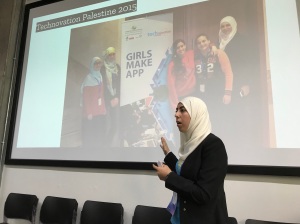 Over the course of the next two days, hundreds of sessions took place on the nine floors of the Ravensbourne College building (each floor designated a “space” to represent a different facet of Mozilla’s approach to the web – like privacy and security, web literacy, open innovation, and digital inclusion). I popped from session to session, taking notes and learning all that I could. I brainstormed with software developers from Scotland on teaching ethics through computer science to my middle schoolers. In another session, I learned about a brilliant company in the UK that teaches code to students through dance and physical expression. One afternoon, I learned about how the Technovation challenge had changed the lives of girls in Palestine. They used online tools to create apps that could solve real-world problems, and thanks to the hard work of female mentors, got the Ministry of Education to provide a platform for them to compete in an international competition. As the session concluded, she discussed not only the technology skills that the girls had gained, but also the confidence and communication skills that she had seen blossom in her group over the course of the competition. In the audience, a CS activist talked about the similar work that she was doing with young girls in Kenya. Next to her, a French programmer described the free, open-source game her team had designed to get kids all over the world interested in coding. One after another, amazing women from all over the world took their turn to talk about the programs and opportunities they were offering to young women in their home countries.
Over the course of the next two days, hundreds of sessions took place on the nine floors of the Ravensbourne College building (each floor designated a “space” to represent a different facet of Mozilla’s approach to the web – like privacy and security, web literacy, open innovation, and digital inclusion). I popped from session to session, taking notes and learning all that I could. I brainstormed with software developers from Scotland on teaching ethics through computer science to my middle schoolers. In another session, I learned about a brilliant company in the UK that teaches code to students through dance and physical expression. One afternoon, I learned about how the Technovation challenge had changed the lives of girls in Palestine. They used online tools to create apps that could solve real-world problems, and thanks to the hard work of female mentors, got the Ministry of Education to provide a platform for them to compete in an international competition. As the session concluded, she discussed not only the technology skills that the girls had gained, but also the confidence and communication skills that she had seen blossom in her group over the course of the competition. In the audience, a CS activist talked about the similar work that she was doing with young girls in Kenya. Next to her, a French programmer described the free, open-source game her team had designed to get kids all over the world interested in coding. One after another, amazing women from all over the world took their turn to talk about the programs and opportunities they were offering to young women in their home countries.
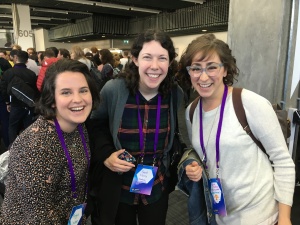 Feminism in the tech world, open source computer programming tools for learners of all ages, programs around the world working to bring the power of the internet to those who need it most, ethical frameworks for creating online, information literacy, and the critical importance of creativity, expression, and activism: and those were just the sessions that I managed to attend. The range of sessions available was incredible. A common thread that I noticed? Each facilitator had created a session that centered around using the power of the internet for good. Each of the 2,000 people gathered believed that the internet, and the people that use it, can be meaningful tools to make the world a better place. The crowd was made of people not asking for permission to change the world, or waiting for someone else to do the work for them. They were rolling their sleeves up, jumping in, and doing the dirty work.
Feminism in the tech world, open source computer programming tools for learners of all ages, programs around the world working to bring the power of the internet to those who need it most, ethical frameworks for creating online, information literacy, and the critical importance of creativity, expression, and activism: and those were just the sessions that I managed to attend. The range of sessions available was incredible. A common thread that I noticed? Each facilitator had created a session that centered around using the power of the internet for good. Each of the 2,000 people gathered believed that the internet, and the people that use it, can be meaningful tools to make the world a better place. The crowd was made of people not asking for permission to change the world, or waiting for someone else to do the work for them. They were rolling their sleeves up, jumping in, and doing the dirty work.
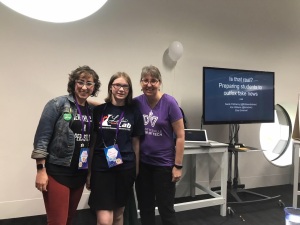 For our session, Ms. Wilkens, STAB student Elsa Emmanuel, and I tackled a topic that was buzzing everywhere throughout the festival – fake news. In both the web literacy track and the youth track, we shared the unit that Ms. Wilkens we have been working through with our fourth graders for the past two years: Foiling Fake News with Fourth Graders. Attendees of our session were as young as 7 years old. We invited session attendees to work through each of the unit activities just like our students, then share reflections and questions with the group. Check out some of the photos from our session and learn more about what we shared. You can also find all of our resources and learn more about our lessons here.
For our session, Ms. Wilkens, STAB student Elsa Emmanuel, and I tackled a topic that was buzzing everywhere throughout the festival – fake news. In both the web literacy track and the youth track, we shared the unit that Ms. Wilkens we have been working through with our fourth graders for the past two years: Foiling Fake News with Fourth Graders. Attendees of our session were as young as 7 years old. We invited session attendees to work through each of the unit activities just like our students, then share reflections and questions with the group. Check out some of the photos from our session and learn more about what we shared. You can also find all of our resources and learn more about our lessons here.
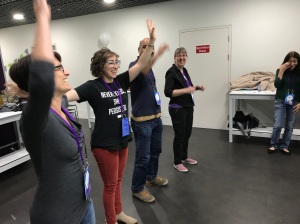 Perhaps the most powerful thing about my experience at MozFest was the diversity of the attendees and facilitators. I have participated in many discussions regarding diversity and the importance of having diverse people in meaningful positions, but I have never gotten to experience it in practice. Additionally, I have never had the opportunity to learn from and alongside so many passionate women. Whether the sessions dealt with feminism or the power of women or not, female voices were loud, confident, and powerful in the discussions and forums. And I can’t forget the librarians! Usually at a conference, I am the only librarian in attendance. At MozFest, there were at least three librarians in every room (loud, funky, determined librarians!). What a unique experience to be able to learn from other librarians from around the world. I’m happy to report that we all share the same passion for education, literature, and digital and web literacy. I made friends and formed relationships that hopefully will lead to exciting collaborations in the future.
Perhaps the most powerful thing about my experience at MozFest was the diversity of the attendees and facilitators. I have participated in many discussions regarding diversity and the importance of having diverse people in meaningful positions, but I have never gotten to experience it in practice. Additionally, I have never had the opportunity to learn from and alongside so many passionate women. Whether the sessions dealt with feminism or the power of women or not, female voices were loud, confident, and powerful in the discussions and forums. And I can’t forget the librarians! Usually at a conference, I am the only librarian in attendance. At MozFest, there were at least three librarians in every room (loud, funky, determined librarians!). What a unique experience to be able to learn from other librarians from around the world. I’m happy to report that we all share the same passion for education, literature, and digital and web literacy. I made friends and formed relationships that hopefully will lead to exciting collaborations in the future.
I left MozFest 2017 feeling inspired, invigorated, and excited to bring new ideas back to the St. Anne’s-Belfield School community.Thank you to MozFest for such a wonderful conference experience, and for St. Anne’s-Belfield School and Kim Wilkens for making it possible for me to attend. It was an experience that I won’t soon forget.
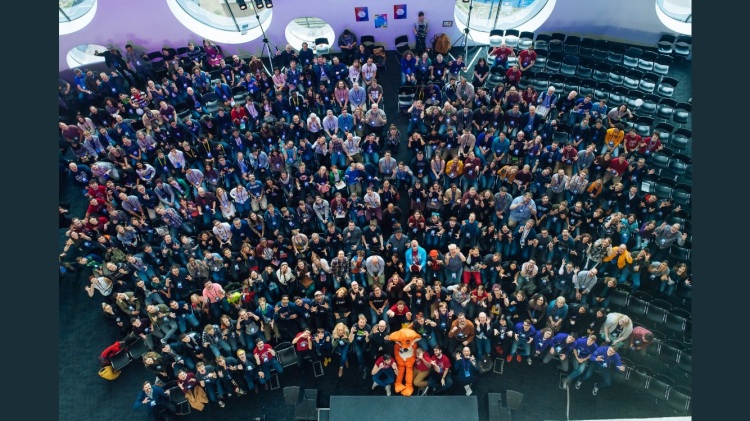

One thought on “My MozFest Experience”